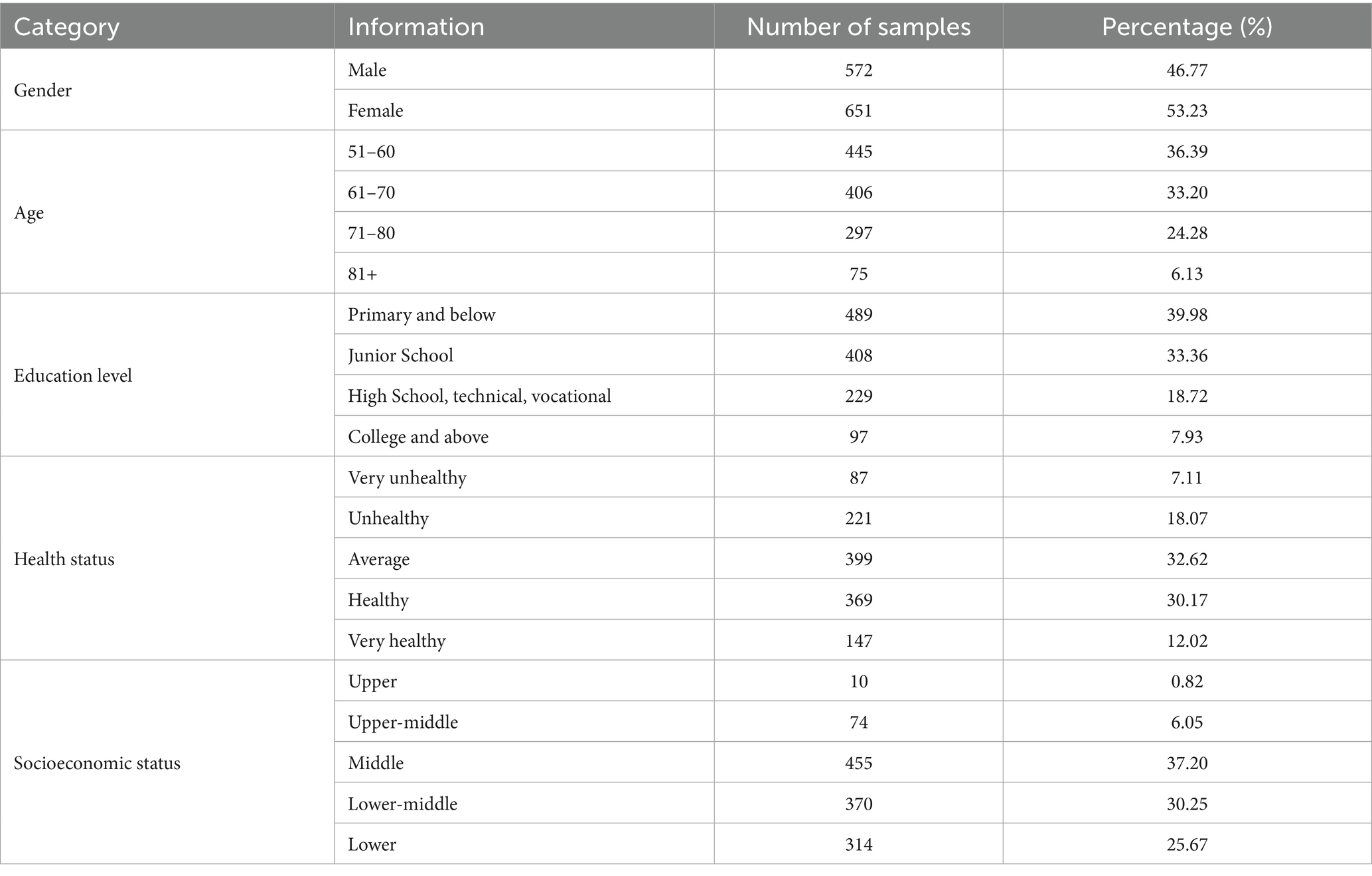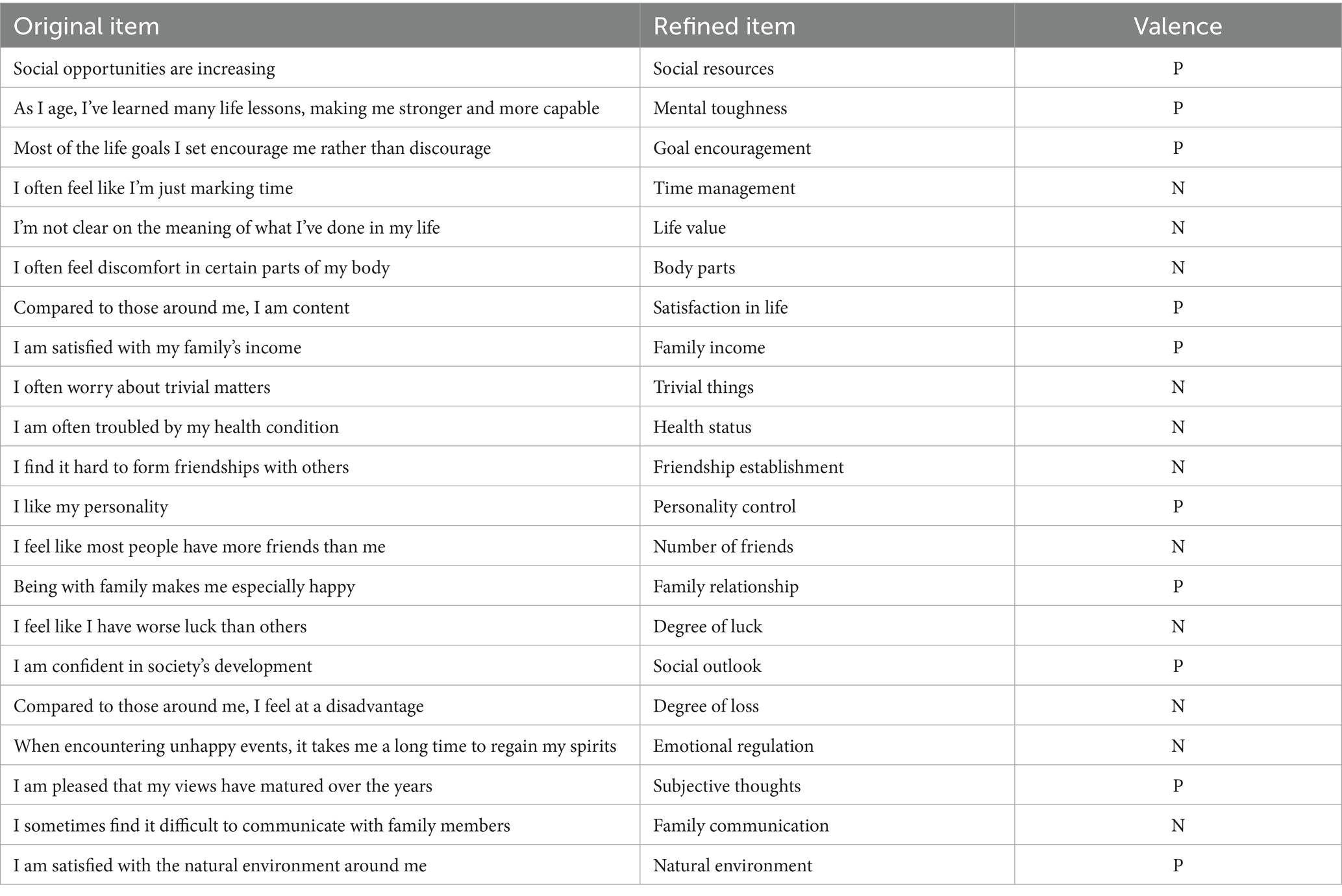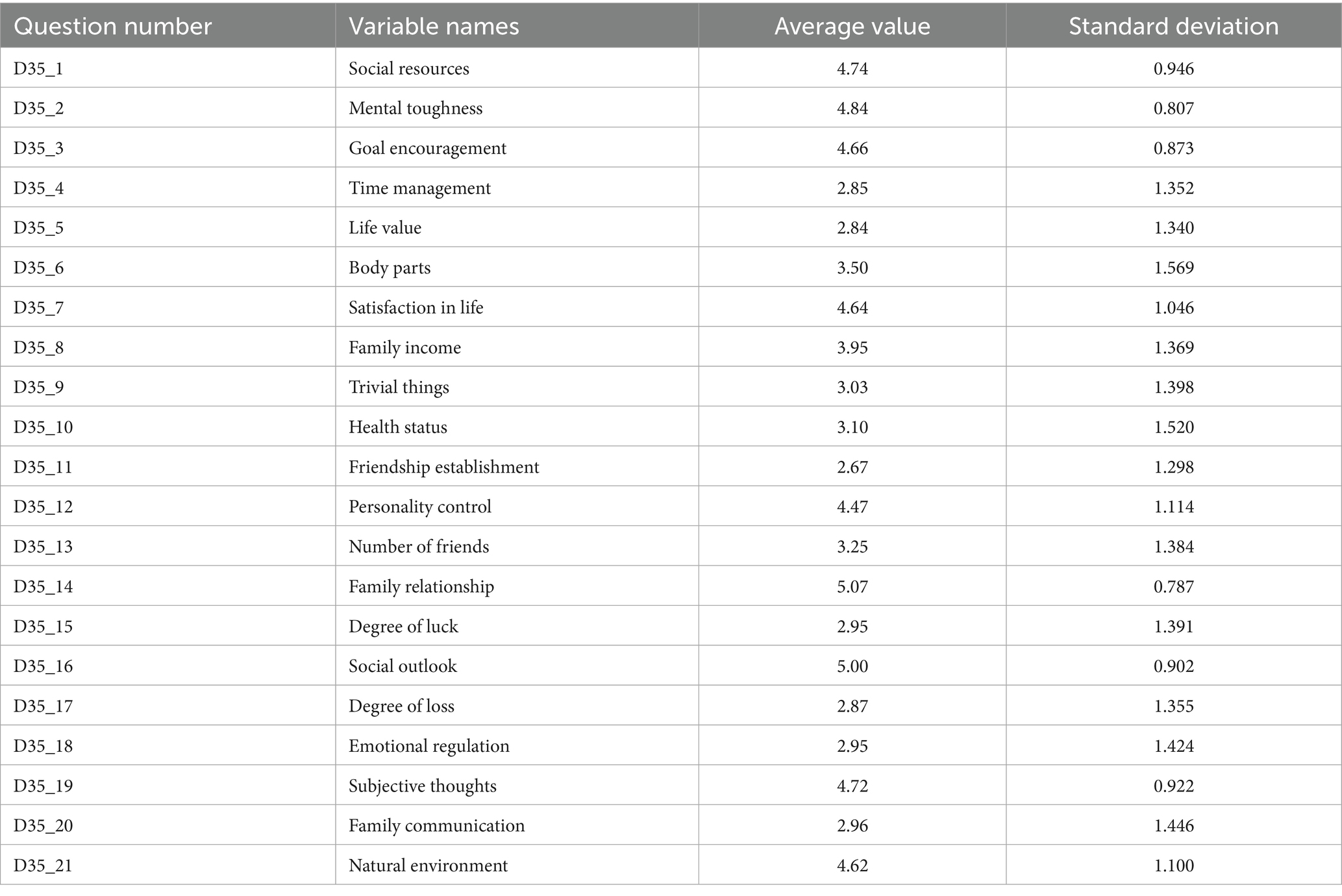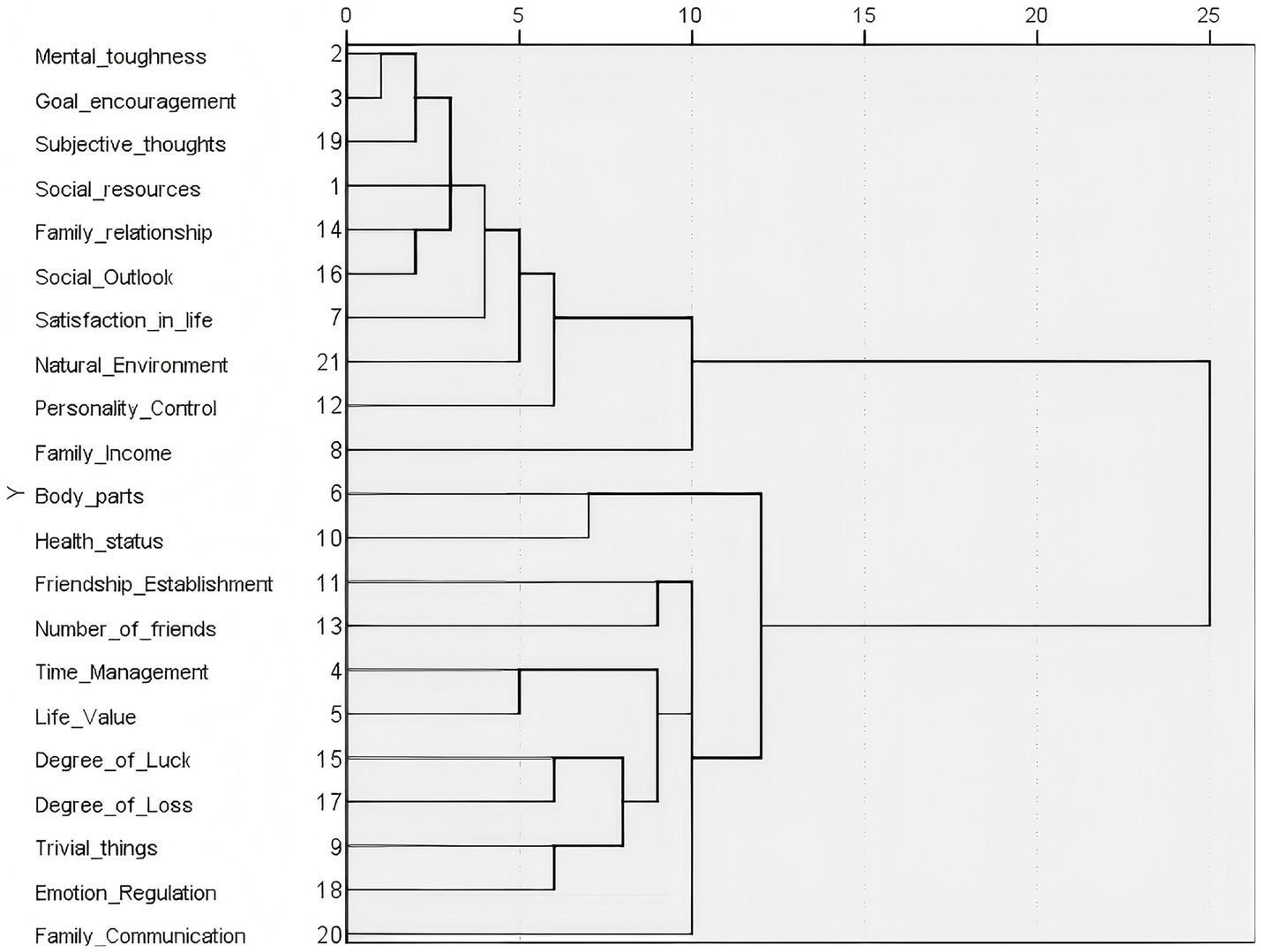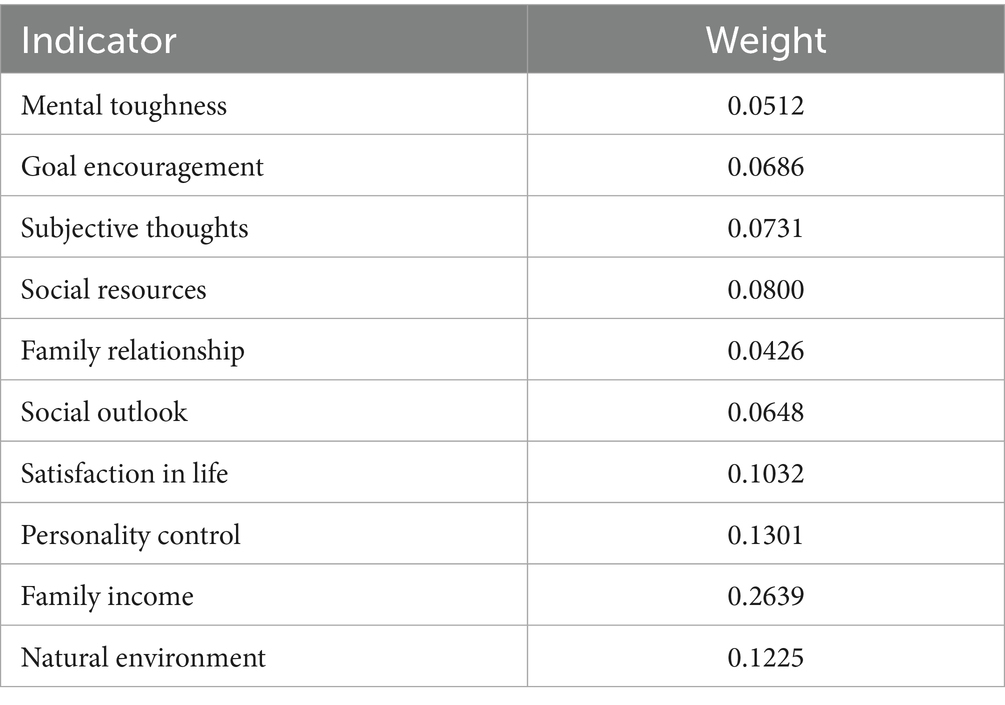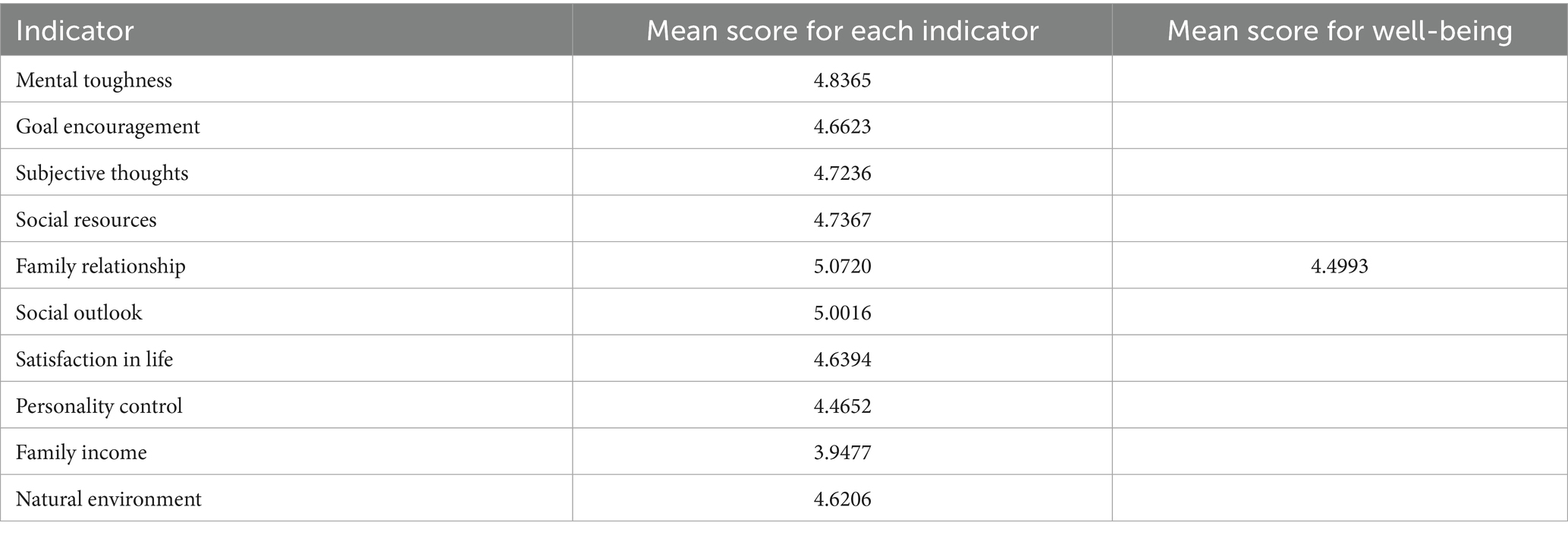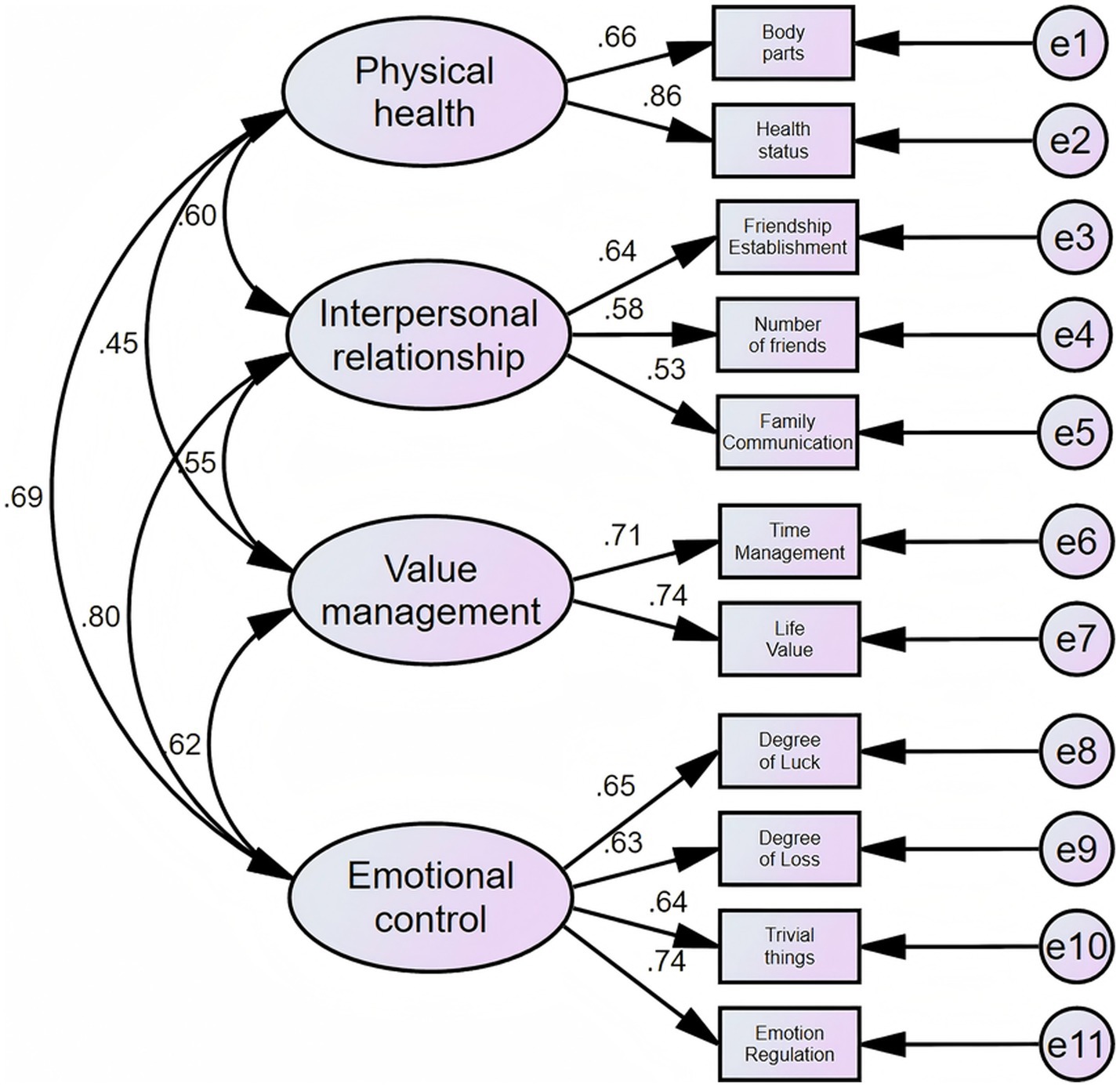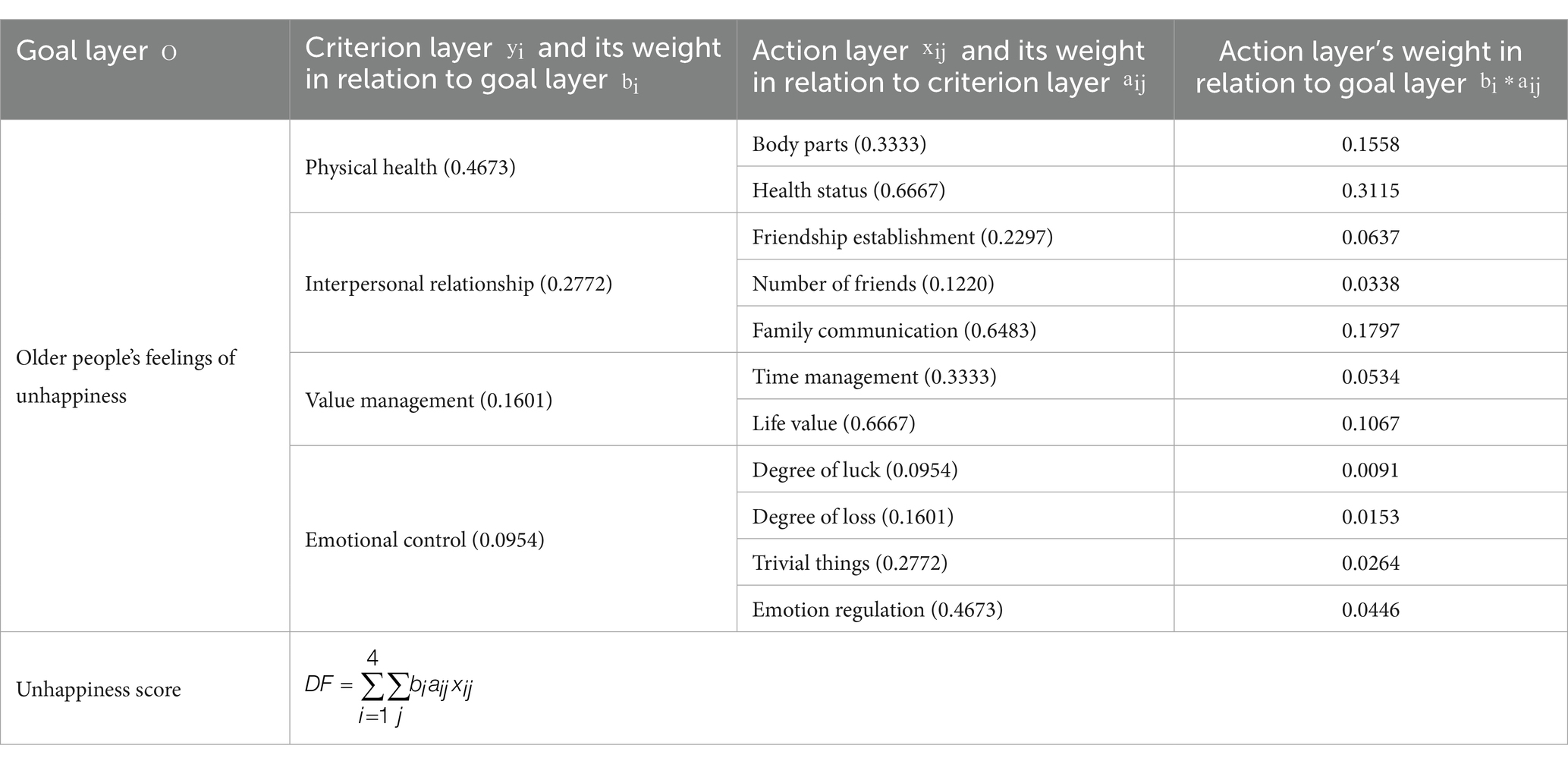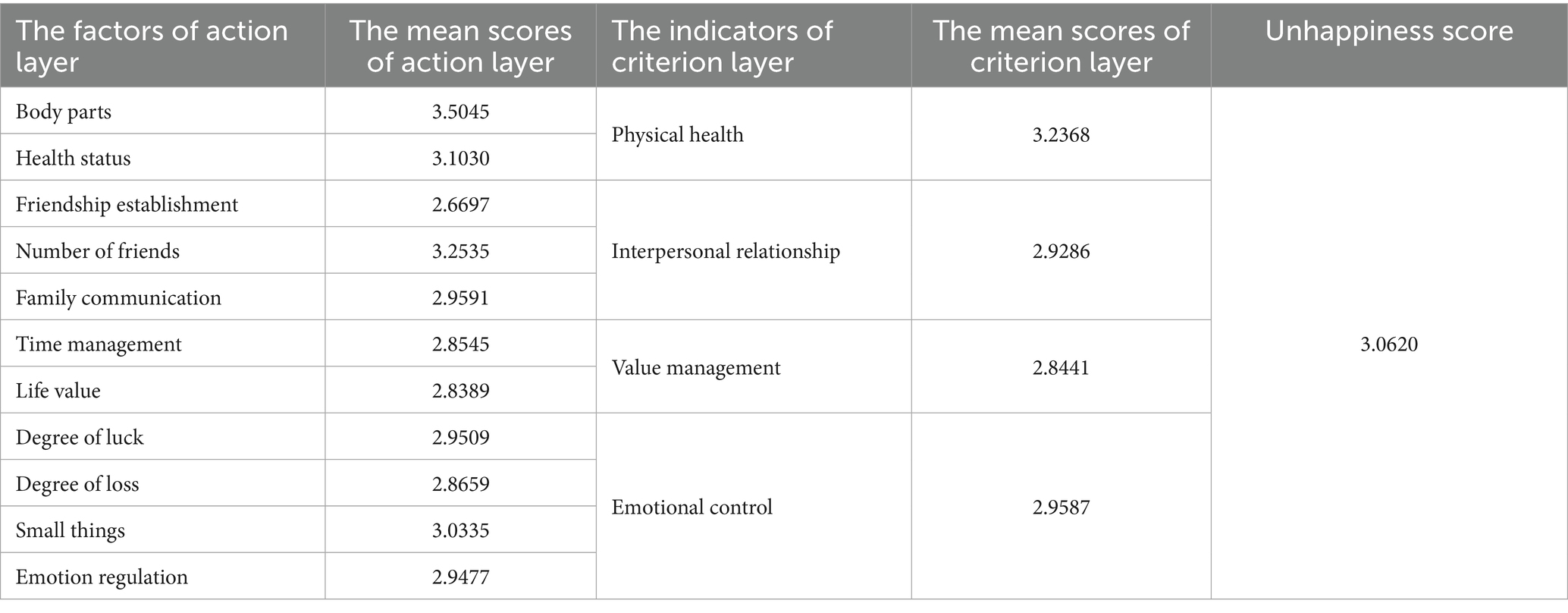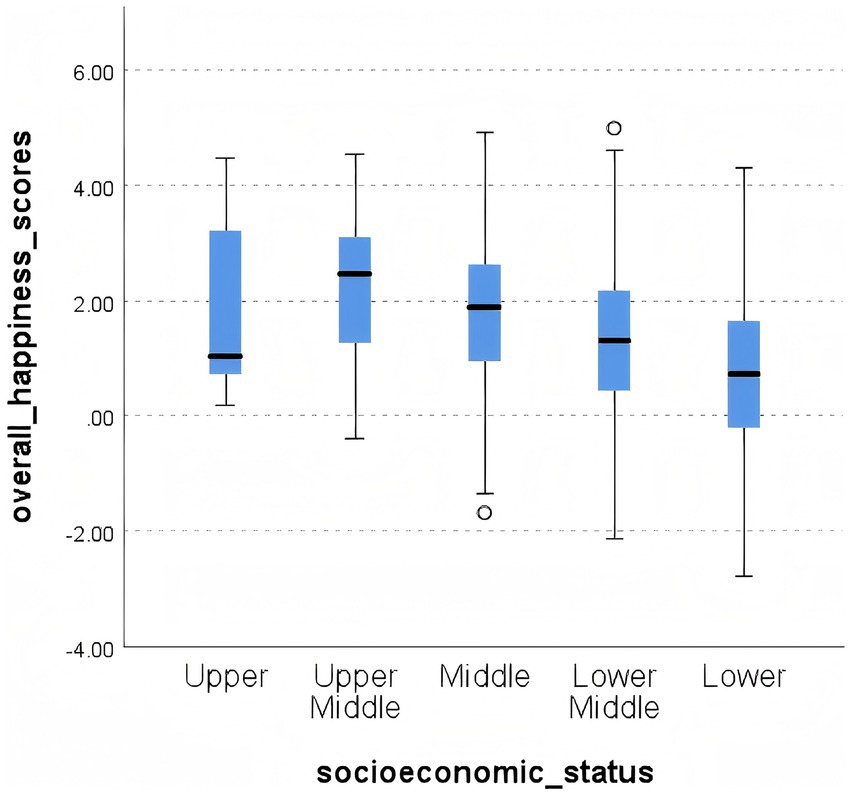- School of Mathematics, Hangzhou Normal University, Hangzhou, China
Background: This paper examines the subjective well-being of older adults in China. Based on data from the China General Social Survey (CGSS2021), the agreement levels of 21 questions on the subjective well-being of older adults were extracted and analyzed.
Methods: The 21 questions were categorized into positive and negative factors based on cluster analysis. For the 10 positive factors, the information entropy method was used to determine their weights and calculate the happiness scores of older adults. For the 11 negative factors, the unhappiness scores of older adults were calculated by the confirmatory factor analysis and analytic hierarchy process.
Results: An average happiness score of 4.499 was obtained, of which the more influential factors were family income, personality control, and the natural environment. An average score of 3.062 was obtained, among them, the more influential factors are health status, family communication and body parts.
Conclusions and recommendations: Overall, it shows that the subjective happiness of the Chinese older adults is strong and unhappiness is weak. Then we further find significant differences in the above scores of older adults with different socioeconomic status through one-way ANOVA. Based on the results of the study, we finally proposed targeted recommendations to improve the happiness feelings of older adults, including encouraging communication with family members and improving body parts.
1 Introduction
According to the seventh national census, older adults demographic, those aged 60 and above (1), constitutes 18.7% of China’s population (2), with those over 65 accounting for 13.5%, indicating a significantly aging populace (3). Projections for 2050 foresee this cohort rising to 34.91%. Amidst relentless societal progress, this demographic shift results in diminished mobility among older adults and psychological challenges such as loneliness, anxiety, and depression, impacting their subjective well-being and quality of life. A comprehensive analysis of influential factors is imperative for enhancing their well-being. This study employs confirmatory factor analysis and analytic hierarchy process to examine data from the CGSS2021, aiming to provide theoretical support for improving older adults’ mental health.
Subjective Well-Being (SWB) is a multidimensional construct reflecting individuals’ evaluations and emotional responses to their life experiences, encompassing cognitive and affective dimensions (4). The cognitive facet pertains to life satisfaction, while the affective element involves positive and negative emotional experiences. Research indicates a U-shaped correlation between subjective well-being and age, with variations observed post-70s in Europe and Central Asia (5). A holistic comprehension requires considering psychological attributes, sociocultural contexts, and lifecycle dynamics. Understanding older adults subjective well-being is pivotal for strategies to sustain their health, foster familial concord, and societal equilibrium, and bolster economic prosperity (6).
2 Literature review
1. Educational attainment: this is a pivotal determinant of the subjective well-being among older adults. The research underscores that education enriches not only one’s cognitive reserves but also significantly influences life quality and psychological satisfaction in later life by bolstering self-identity and self-esteem. Huang (7) elucidates that individuals with advanced educational backgrounds, including high school, junior college, and university degrees, exhibit heightened subjective well-being. Jin et al. (8) accentuated education’s role in the well-being of older adults, with higher educational attainment linked to superior health awareness and broader social resource access, which are conducive to the well-being of older adults.
2. Social support: Yao et al. (9) study, published in the Psychological Journal, provided an insightful exploration into the psychological impact of social support on the social well-being of older adults and the mechanisms at play. The research revealed that social support exerts a substantial influence on social well-being by fostering hope and mitigating feelings of loneliness. Jia and Zhou (10) underscored the positive role of social support, encompassing familial bonds and social networks, in enhancing psychological well-being and life satisfaction among older adults. It was observed that increased social support correlates with diminished loneliness and elevated life satisfaction and subjective well-being among older adults.
3. Socioeconomic status: Wang (11) study meticulously examined the mental health implications of socioeconomic status among older adults, uncovering a robust positive correlation with their mental well-being. It was observed that elevated income levels, higher social strata, and greater self-assessed socioeconomic standing are indicative of the older adults’ enhanced subjective well-being, a conclusion that withstood the test of statistical scrutiny. Furthermore, the study highlighted that augmenting perceptions of fairness, broadening social interactions, and refining leisure and recreational activities are pivotal conduits through which socioeconomic status positively influences the subjective well-being of older adults.
4. Residential milieu: Guo (12) highlighted that the residential milieu and social engagement significantly influence the psychological well-being of older adults. An auspicious living environment can furnish a congenial habitat and augment life contentment, whereas social engagement can mitigate solitude, amplify the perception of social integration, and exert a salutary influence on the subjective well-being of seniors.
5. Self-health assessment: Yin et al. (13) have elucidated that health self-assessment is intricately linked to the subjective well-being of older adults. A favorable health self-assessment is correlated with heightened life satisfaction and diminished depression among older adults, consequently bolstering their well-being. Cai et al. (14) have underscored that the health status of older adults is a direct determinant of their subjective well-being. Older adults in good health are more inclined to report elevated levels of well-being. Moreover, health issues and functional impairments may curtail older adults’ engagement in social activities, thereby impacting their well-being, and depressive symptoms exert a deleterious effect on the well-being of older adults.
6. Internet utilization: Ding et al. (15) have underscored the profound influence of internet utilization on the subjective well-being of older adults. Engaging in online learning, social interactions, and recreational pursuits, internet usage augments older adults’ perception of social engagement and autonomy, thus elevating their overall well-being and sense of community. Conversely, Kraut et al. (16) have determined that excessive digital immersion can lead to diminished social involvement, curtailed communication with kin, and a constricted social network, potentially intensifying sentiments of melancholy and solitude, and diminishing the well-being of older adults.
7. Marital status: Shi et al. (17) have highlighted that marital status exerts a substantial influence on the well-being of older individuals. Unmarried or widowed seniors are prone to encounter diminished well-being. Matrimony offers avenues for emotional succor and social communion, which are pivotal to the well-being of the aging population.
8. Scholarly interest in seniors’ subjective well-being: Yu et al. (18) research indicates that the contemporary state and determinants of subjective well-being among older adults garnered scholarly attention in the 1950s, with studies on positive influences on subjective well-being progressively surfacing, spurred by the advent of the positive psychology movement.
9. Variations in older adults subjective well-being: The subjective well-being of older adults is subject to individual differences, yet broadly, numerous seniors experience a comparatively elevated quality of life and well-being. This is attributable to an enhanced old-age welfare system, expanded avenues for social engagement and interaction, superior health status and medical care, and the presence of agreeable living environments (19). Broadly, a rising trend in subjective well-being is observed among older adults in numerous nations, albeit with a minority of countries exhibiting reduced well-being levels. Nonetheless, certain senior individuals confront challenges such as social seclusion, economic hardships, health complications, and other factors that impinge upon their subjective well-being.
3 Data sources
This study utilizes data from the CGSS2021, conducted by the Institute of Sociology at the Chinese Academy of Social Sciences (CASS) in 2021. The survey employed probability sampling for household interviews, covering 21 regions with a sample size of 8,148 individuals. After data screening and imputing missing values, we analyzed individuals aged 50 and above, resulting in a sample size of 1,223. The demographic details of this cohort are presented in Table 1.
4 Study design and results
To facilitate subsequent modeling, we extracted relevant phrases from the D35 form within the questionnaire, initially categorizing them as positive (P) or negative (N) based on their semantic content. The findings are presented in Table 2.
To enhance the forthcoming modeling, we eliminated the responses of “do not know” and “refusal to answer.” Subsequently, we apportioned a numerical value to the level of concordance for each of the 21 tabled queries, sequentially graded as follows: Strongly Disagree = 1; Disagree = 2; Slightly Disagree = 3; Slightly Agree = 4; Agree = 5; Strongly Agree = 6.
In this study, each variable is clearly defined based on relevant psychological theories. Social resources, based on social support theory, refer to accessible and perceivable social networks, community resources, and participation opportunities, crucial for mental health and well-being. Mental toughness, based on psychological resilience theory, refers to the ability to recover from hardships, manage stress, and achieve positive growth. Goal encouragement, based on goal - setting theory, represents the motivating power of self - defined goals, spurring action and self - efficacy.
Time management, based on self - regulation theory, involves time planning, distribution, and oversight to boost efficiency and balance life aspects. Life value, in humanistic psychology, is the subjective understanding of existence meaning, life purpose, and activity worth. Body parts, based on mind - body interaction theory, refer to subjective awareness of physical sensations and health conditions, impacting emotions.
Satisfaction in life, based on subjective well-being theory, is cognitive and emotional contentment with life quality. Family income, in economic psychology, includes family earnings and individuals’ financial satisfaction. Trivial things, based on emotion psychology, are daily nuisances evoking negative feelings. Health status, in health psychology, is the subjective appraisal of physical health and disease influence.
Friendship establishment, based on social interaction theory, is building intimate connections through social communication. Personality control, based on personality psychology, is the ability to identify, embrace, and regulate traits for social adaptation. Number of friends, in social network theory, reflects social connection scale and belonging. Family relationship, in family systems theory, focuses on emotional and behavioral interaction quality among family members.
Degree of luck, based on cognitive psychology, is the subjective judgment of life event favorability. Social outlook, in social - cognitive theory, is anticipation and confidence in social development trends. Degree of loss, based on social comparison theory, is perceived disadvantage in resource and benefit comparison. Emotional regulation, based on emotion regulation theory, is applying strategies to manage emotions and maintain equilibrium.
Subjective thoughts, in cognitive development theory, are distinctive cognitions formed through personal experiences. Family communication, based on communication theory, is information and emotion exchange within the family. Natural environment, in environmental psychology, is the subjective assessment of natural ecological and landscape elements.
4.1 Descriptive statistics of the variables
To obtain a comprehensive overview of the responses to each query, we calculated the mean and standard deviation of the agreement levels for the 21 questions, with the results outlined in Table 3.
The scoring criteria for agreement are as follows: “Strongly agree” is assigned a score of 6, “Agree” a score of 5, “Somewhat agree” a score of 4, “Somewhat disagree” a score of 3, “Disagree” a score of 2, and “Strongly disagree” a score of 1. Data analysis reveals a significant disparity in the mean scores between questions indicating positive sentiments (1, 2, 3, 7, 8, 12, 14, 16, 19, 21) and those indicating negative sentiments (4, 5, 6, 9, 10, 11, 13, 15, 17, 18, 20). The standard deviation of the agreement scores for the 21 questions is approximately 1, indicating a high degree of consistency in older adults’ level of agreement with each question.
4.2 Analysis of systematic clustering results
These 21 indicators were subjected to systematic clustering analysis using SPSS, with the dendrogram of the clustering outcomes presented in Figure 1 (20).
As illustrated in the figure, the significant divergence in mean values between questions reflecting positive and negative sentiments led to their segregation into two distinct clusters. The outcomes of the cluster analysis align perfectly with our initial semantic assessments. Among the 10 questions indicative of positive sentiments, further stratification was found to be infeasible. Subsequent confirmatory factor analysis, despite numerous refinements to the model’s path diagram, yielded unsatisfactory fitting indices, leading us to conclude that these 10 questions are not amenable to confirmatory factor analysis. Consequently, we employed the information entropy method to ascertain the weights of the 10 questions, enabling the computation of well-being scores for each older adult individual, reflecting positive sentiments, on a weighted basis.
The 11 questions reflecting negative sentiments exhibit a clear hierarchical structure. Based on the clustering results and the specific meanings of each factor, the secondary indicators of the agreeableness evaluation index factors can be categorized into four groups: physical health, encompassing body parts and health status questions; interpersonal relationships, including friendship establishment, the number of friends, and family communication; value management, with questions on time management and life value; and emotional control, comprising the degree of luck, the degree of loss, trivial matters, and emotional regulation.
4.3 Modeling of positive factors based on the information entropy method
4.3.1 Determine the weight of each index of positive factors based on the information entropy method
The information entropy method allows us to assess the degree of dispersion for a certain indicator. According to the definition of information entropy, a smaller entropy value indicates greater dispersion and consequently, a higher weight for that indicator. For this study, data reflecting positive feelings are recorded as matrix Z, a 1223 × 10 matrix, representing 10 indicators: mental toughness, goal encouragement, subjective thoughts, social resources, family relationship, social outlook, satisfaction in life, personality control, family income, and natural environment. Using the tool of information entropy, the weights of the indicators of positive factors were calculated to ensure the objectivity of the results as follows (21):
1. Standardize data:
Where indicates raw data corresponding to the indicator, indicates the all data under indicator.
2. Calculate the probability matrix: Calculate the proportion of the - data under the indicator, regard it as the probability to be used in the calculation of information entropy, and get the probability matrix P. The formula is as follows:
3. Calculate the information entropy of the indicator:
4. Calculate the discrimination of the indicator:
5. Calculate the weight: the normalized discrimination is used as the weight of the corresponding indicator.
Through the above steps, we calculate the weights of 10 indicators in Table 4.
Analyzing these factors, it becomes evident that the criteria of familial financial stability, self-perceived personality, and the natural surroundings carry significant weight. This implies that seniors who find contentment in their household’s economic status, their personal character, and the natural ambiance that envelops them are more inclined to experience heightened happiness.
4.3.2 Calculation of well-being scores for older people
Since each data value is one of 1, 2, 3, 4, 5, 6, there is no difference in order of magnitude and scale, so each older adult’s well-being score can be obtained by weighting the agreement score of these indicators:
Well-being scores portray the magnitude of the well-being of these older adults, with higher scores indicating greater well-being. Below we have calculated the mean scores for each of these indicators and for well-being, and the results are in Table 5.
4.4 Modeling of negative factors based on confirmatory factor analysis and analytic hierarchy process
4.4.1 Constructing the agreement evaluation structure of negative factors based on confirmatory factor analysis
First, KMO and Bartlett’s test of sphericity was conducted on the data of the 11 questions reflecting negative feelings in Table 6.
KMO is a test used to assess the correlation and partial correlation between variables, the value is between 0 and 1, the closer the value is to 1, the stronger the correlation between variables, the weaker the partial correlation, the better the effect of the factor analysis. From our result, we had a KMO value of 0.866, which indicates that the source of agreement is suitable for the application of the factor analysis. Bartlett’s test of sphericity is used to test the independence of variables, and the significance is 0 (<0.05), which indicates that the sample is suitable for factor analysis (22).
The path diagram and standardized path coefficients of the confirmatory factor analysis (23) are shown in Figure 2. Each question is a factor representing a tertiary indicator and is attributed to the corresponding secondary indicator.
Except for the coefficient value of physical health to value management (which is 0.45), which is less than 0.5, the coefficient value of each entry to the factor to which it belongs is greater than 0.5, which indicates that the classification is reasonable. The evaluation metrics for the overall fitting results of the model are given in Table 7.
Each model metric meets the Criterion for goodness of fit, indicating that the structure of the agreement evaluation of negative factors is reasonable.
4.4.2 Determining the weight of each indicator of negative factors based on analytic hierarchy process
Define the primary indicator of the agreement evaluation structure of the negative factors in 4.4.1 as the feeling of unhappiness, and take it as the goal layer of the negative factors, and the corresponding secondary and tertiary indicators as the criterion layer and the action layer, respectively.
Using the ratio scale of 1 to 9 and its inverse proposed by Saaty to establish a positive reciprocal matrix, the positive reciprocal matrix of the criterion layer to the goal layer of the negative factor (denoted as A) was obtained based on the table of ratio scale and the relative importance of each factor at corresponding level (24) by asking the professionals and referring to the relevant information as shown below:
After calculation, the maximum eigenvalue of matrix A: , and its normalized eigenvector is:
Consistence Index , the random index is 0.9 (when n = 4) given by Saaty, the consistency ratio is obtained: , so matrix A passes the consistency test, and the weight of the criterion layer relative to the goal layer is obtained:
Similarly, by asking the professionals and referring to the relevant information, we get the positive reciprocal matrices of the action layer of negative factors to the criterion layer (physical health, interpersonal relationship, value management, and emotional control in order) are noted as A1, A2, A3, A4, and there are:
In particular, for 2nd-order matrices, the consistency ratio does not apply, and it is usually not necessary to perform consistency tests on 2nd order matrices because they are inherently consistent. The indicators corresponding to these 4 matrices are obtained as shown in Table 8.
The results showed that all four matrices pass the consistency test. Furthermore, the consistency ratio of hierarchical total sorting of negative factors was obtained: , it had a more satisfactory consistency and the results of this analysis were accepted.
4.4.3 Calculation of unhappiness scores of older people
An evaluation system of the sources of unhappiness feelings of older adults was established and the results are shown in Table 9.
Upon examination, it is discerned that the parameters of health status, familial interaction, and physical well-being are accorded greater importance. This suggests that older adults who harbor concerns regarding their health, encounter barriers in communicating with their kin, and frequently experience discomfort are predisposed to a state of increased unhappiness.
Accordingly, the scores for each older adult’s criterion and goal layers can be derived from their action layer scores, with the unhappiness score reflecting the extent of their unhappiness—higher scores denote greater unhappiness. Below, we have calculated the average scores for each of these indicators and unhappiness, with the results in Table 10.
As noted in section 4.3.2, the mean well-being score is 4.499, situated between 4 and 5. This suggests that older individuals, on the whole, fall between somewhat agreeing and agreeing on these positive aspects. Conversely, the mean unhappiness score and the corresponding criterion layer scores approximate 3, indicating that older adults generally lean toward somewhat disagreeing on these negative aspects. Thus, the overall well-being of older adults can be regarded as robust.
4.5 The role of different socioeconomic status on overall subjective well-being scores
We have established an evaluative framework for gauging the happiness and unhappiness of older adults, deriving an overall happiness score by subtracting the unhappiness score from the happiness score. A higher score indicates greater overall happiness and, to a significant extent, suggests psychological well-being. However, further detailed analysis is warranted to discern the nuances in the overall happiness of older adults and to formulate more precise recommendations.
To this end, we initially determine whether significant disparities exist in the overall happiness scores among older adults with varying classification outcomes using ANOVA. Subsequently, we integrate these findings with the satisfaction evaluation system to propose targeted recommendations for enhancing the overall happiness of older adults.
The dataset from question A43e and the calculated overall happiness scores were imported into SPSS, confirming normal distribution via KS (Kolmogorov–Smirnov Test) (25) and SW tests. It was determined that group variances were homogeneous (with chi-square test significance above 0.05), and group means were significantly different (ANOVA test significance below 0.05). It was concluded that older adults with varying socioeconomic statuses have distinct overall happiness scores. The means and box plots of the overall happiness scores for each group are in Table 11 and Figure 3 (26).
This suggests that older adults in lower socioeconomic strata exhibit lower overall happiness scores and are more susceptible to psychological issues, thus necessitating additional attention. U. S. - based research demonstrates that low—income older adults frequently encounter diminished quality of life and heightened psychological distress due to economic pressures, a finding that aligns with the circumstances of this group in China and underscores the urgency of focused attention. Additionally, we observe that the overall happiness of the upper and middle strata is comparable, with the upper—middle stratum displaying the highest overall happiness. The “diminishing marginal effect of income” theory proposed by Western research posits that as economic income levels rise, the enhancement effect of income on happiness gradually diminishes. Beyond a certain threshold, further income increases have limited impact on happiness enhancement and may even lead to a decline (27). This relationship is also evident in the Chinese context, where the upper - middle class, benefiting from economic stability and greater opportunities for social engagement, achieves a balance between economic security and social participation, thereby enjoying the highest level of happiness. Notably, research from Nordic countries like Sweden and Norway reveals that a robust social welfare system (e.g., free medical care, substantial old—age allowances) can effectively mitigate the impact of economic status disparities on well-being. This highlights the pivotal role of social policy in regulating the relationship between economic status and well-being, offering significant international insights for optimizing future policies in China to enhance the overall well-being of older adults across diverse socioeconomic strata.
5 Conclusions and recommendations
5.1 Conclusions
5.1.1 Positive factors have a positive effect on the subjective well-being of older adults
The positive factor model, as outlined by the information entropy method and systematic cluster analysis, highlights the beneficial effects of positive factors such as family income, personality control, and natural environment on the subjective well-being of older adults. These factors enhance life satisfaction and emotional states, thereby improving the overall quality of life. They foster social engagement and a sense of belonging, which in turn enhance well-being. Moreover, these positive factors act as psychological capital, equipping older individuals to navigate life’s challenges and mitigate negative emotions more effectively.
5.1.2 Negative factors have a negative effect on the subjective well-being of older adults
The negative factor model, established through confirmatory factor analysis and analytic hierarchy process, reveals the substantial negative impact of factors such as health status, family communication, and body parts on the subjective well-being of older adults. Collectively, these factors impair mental health and life quality by affecting daily functioning and self-care, increasing loneliness and social isolation, diminishing life purpose and meaning, and destabilizing emotions, thereby reducing subjective well-being. The compound effects of physical health issues leading to restricted mobility and social engagement, loneliness from deficient interpersonal connections, a lack of purpose due to poor value management, and emotional instability from inadequate emotional control all contribute to a decline in older individuals’ emotional states and life satisfaction, culminating in a reduced sense of well-being.
The findings of this study provide a new perspective for understanding the complexity of subjective well-being in older adults and provide a scientific basis for developing strategies to enhance their mental health and well-being. Through targeted interventions, the quality of life and well-being of older adults can be effectively improved, and social harmony and stability can be promoted.
5.2 Recommendations
1. Financial stability for older adults: it is imperative for governments to implement tax incentives and social security disbursements to safeguard the economic well-being of senior citizens. Additionally, non-profit entities should offer comprehensive financial literacy programs aimed at assisting the aged in astutely managing their retirement funds. This proactive approach not only mitigates financial strain but also bolsters their psychological comfort and overall sense of security.
2. Cultivating personality and self-insight: community mental health hubs should routinely convene workshops focused on the refinement of personal character and the enhancement of self-awareness. These initiatives should be designed to encourage seniors to delve into their individual passions and principles, thereby amplifying their self-efficacy and fostering a constructive evolution of their personal identities.
3. Integration with nature: municipal authorities ought to expand the allocation of verdant areas and actively engage older adults in horticultural and naturalistic pursuits. Immersion in natural settings is instrumental in alleviating stress, thereby augmenting the psychological well-being and elevating the life quality of senior individuals.
4. Health surveillance and wellness: medical establishments must offer periodic complimentary health assessments and curate detailed health profiles for the senior population. This enables the proactive identification and management of health issues. A robust physical constitution underpins mental health, and consistent health surveillance is pivotal for older adults to sustain an optimistic mental disposition.
5. Intergenerational dialogue and affective bonding: it is essential for families to foster open lines of communication across generations and to orchestrate frequent familial reunions. Such efforts fortify the emotional fabric that unites family members. Robust familial interactions serve as a conduit for emotional succor, mitigating the sense of isolation and fostering a robust social network for older adults.
6. Enhancing physical vigor: the realm of sports and wellness must advocate for exercises tailored to the senior demographic, including practices like Tai Chi and yoga, with an emphasis on holistic bodily health. Through regular physical engagement, older adults can augment their fitness levels, diminish disease susceptibilities, and concurrently elevate their self-assurance and psychological well-being.
Data availability statement
The original contributions presented in the study are included in the article/supplementary material, further inquiries can be directed to the corresponding author.
Ethics statement
Ethical review and approval was not required for the study on human participants in accordance with the local legislation and institutional requirements. Written informed consent from the (patients/participants or patients/participants legal guardian/next of kin) was not required to participate in this study in accordance with the national legislation and the institutional requirements.
Author contributions
YC: Conceptualization, Data curation, Writing – original draft, Resources, Writing – review & editing, Project administration. TC: Data curation, Formal analysis, Methodology, Validation, Writing – original draft, Writing – review & editing. RT: Supervision, Writing – review & editing.
Funding
The author(s) declare that no financial support was received for the research and/or publication of this article.
Acknowledgments
The authors would like to express their gratitude and thanks to the Chinese General Social Survey (CGSS).
Conflict of interest
The authors declare that the research was conducted in the absence of any commercial or financial relationships that could be construed as a potential conflict of interest.
Generative AI statement
The authors declare that no Gen AI was used in the creation of this manuscript.
Publisher’s note
All claims expressed in this article are solely those of the authors and do not necessarily represent those of their affiliated organizations, or those of the publisher, the editors and the reviewers. Any product that may be evaluated in this article, or claim that may be made by its manufacturer, is not guaranteed or endorsed by the publisher.
References
1. Ning, JZ. The main data situation of the seventh national population census. China Statistics. (2021):4–5. Available online at: https://www.zhangqiaokeyan.com/academic-journal-cn_detail_thesis/02012103084837.html (Chinese)
2. Mu, GZ, and Zhang, T. Development trend of population aging in China and its strategic response. J Huazhong Norm Univ Hum Soc Sci. (2011) 50:29–36. doi: 10.3969/j.issn.1000-2456.2011.05.005 (Chinese)
3. Huang, Y, and Tong, XG. Analysis of the current situation of population aging in China. Chin J Gerontol. (2012) 32:4853–5. doi: 10.3969/j.issn.1005-9202.2012.21.133 (Chinese)
4. Diener, E, Oishi, S, and Lucas, RE. Personality, culture, and subjective well-being: emotional and cognitive evaluations of life. Annu Rev Psychol. (2003) 54:403–25. doi: 10.1146/annurev.psych.54.101601.145056
5. Bauer, JM, Levin, V, Munoz Boudet, AM, Nie, P, and Sousa-Poza, A. Subjective well-being across the lifespan in Europe and Central Asia. J Popul Ageing. (2017) 10:125–58. doi: 10.1007/s12062-016-9148-0
6. Watkins, P, Woodward, K, Stone, T, and Kolts, R. Gratitude and happiness: development of a measure of gratitude, and relationships with subjective well-being. Soc Behav Pers. (2003) 31:431–51. doi: 10.2224/sbp.2003.31.5.431
7. Huang, JW. Income and happiness of Chinese urban residents: based on the data of the 2005 Chinese general social survey. Society. (2013) 33:181–203. doi: 10.15992/j.cnki.31-1123/c.2013.05.009 (Chinese)
8. Jin, L, Zhang, Z, and Jing, F. The impact of internet use in the digital age on the subjective well-being of older adults -- an empirical study based on CGSS2021 data. Heliyon. (2023) 9:e21528. doi: 10.1016/j.heliyon.2023.e21528
9. Yao, RS, Guo, MS, and Ye, HS. The mediating effects of hope and loneliness on the relationship between social support and social well-being in the elderly. Acta Psychol Sin. (2018) 50:1151–8. doi: 10.3724/SP.J.1041.2018.01151 (Chinese)
10. Jia, L, and Zhou, XC. Internet use and Chinese older adults’ subjective well-being (SWB): the role of parent - child contact and relationship. Comput Hum Behav. (2021) 119:106725. doi: 10.1016/j.chb.2021.106725
11. Wang, XH. The impact of socio-economic status on the subjective well-being of the elderly. J Dalian Univ Technol Soc Sci. (2021) 42:92–100. doi: 10.19525/j.issn1008-407x.2021.03.011 (Chinese)
12. Guo, YY. A study on the association between smart aging and mental health of older adults. Sci Consult. (2024) 5:110–3. Available online at: https://kns.cnki.net/kcms2/article/abstract?v=hQuCc5bkPPMERsFfKxT9gOIgEDoM7TSXg_b5j6hDrm_nkXSl10MH6MvSWeU_HsfVfUry9wnAXDc6HvyK6X3su2LIHHssWh2sIYDRjtTVU8xjz5sloi2VFAuqjvxBHdbGRU0onSMOtjoMWVzZjdicL-tRxnVWEjqMYQ05BHbpB845TIG_c9J4-w==&uniplatform=NZKPT&language=CHS (Chinese)
13. Yin, LX, Wang, HR, and Gao, JL. Effect of cognitive function on mental health status among rural elderly: Mediating effects of attitudes toward aging. Chin J Health Psychol. (2023) 31:1773–9. doi: 10.13342/j.cnki.cjhp.2023.12.003 (Chinese)
14. Cai, H, Jin, Y, Liu, R, Zhang, Q, Su, Z, Ungvari, GS, et al. Global prevalence of depression in older adults: a systematic review and meta - analysis of epidemiological surveys. Asian J Psychiatr. (2023) 80:103417. doi: 10.1016/j.ajp.2022.103417
15. Ding, XY, Yuan, LQ, and Zhou, Y. Internet access and older adults' health: evidence from China. China Econ Rev. (2023) 82:102047. doi: 10.1016/j.chieco.2023.102047
16. Kraut, R, Patterson, M, Lundmark, V, Kiesler, S, Mukopadhyay, T, and Scherlis, W. Internet paradox. A social technology that reduces social involvement and psychological well-being? Am Psychol. (1998) 53:1017–31. doi: 10.1037/0003-066X.53.9.1017
17. Shi, J-G, Liu, M, Fu, G, and Dai, X. Internet use among older adults: determinants of usage and impacts on individuals’ well-being. Comput Hum Behav. (2023) 139:107538. doi: 10.1016/j.chb.2022.107538
18. Yu, Y, Fong, VW, Lau, JT, Sum, RK, Leung, EF, and Mo, PK. The associations between psychological needs, health - related quality of life and subjective well-being among Chinese older people: a cross - sectional study. Health Soc Care Community. (2022) 30:570–8. doi: 10.1111/hsc.13160
19. Diener, E, and Tay, L. Subjective well-being and human welfare around the world as reflected in the Gallup world poll. Int J Psychol. (2015) 50:135–49. doi: 10.1002/ijop.12136
20. Benassi, M, Garofalo, S, Ambrosini, F, Sant'Angelo, RP, Raggini, R, De Paoli, G, et al. Using two - step cluster analysis and latent class cluster analysis to classify the cognitive heterogeneity of cross - diagnostic psychiatric inpatients. Front Psychol. (2020) 11:1085. doi: 10.3389/fpsyg.2020.01085
21. Jia, H, and Wang, L. Introducing entropy into organizational psychology: an entropy - based proactive control model. Behav Sci. (2024) 14:54. doi: 10.3390/bs14010054
22. Yang, M, Chen, L, and Guo, W. Social participation and subjective well-being among older adults in China: the mediation effect of media use. Curr Psychol. (2024) 43:20041–55. doi: 10.1007/s12144-024-05796-x
23. Liu, Y, Wu, J, Fu, Q, Feng, H, Liu, J, Fang, Y, et al. A method for constructing an ergonomics evaluation indicator system for community aging services based on Kano - Delphi - CFA: a case study in China. Adv Eng Inform. (2024) 62:102842. doi: 10.1016/j.aei.2024.102842
24. Ishizaka, A, and Labib, A. Review of the main developments in the analytic hierarchy process. Expert Syst Appl. (2011) 38:14336–45. doi: 10.1016/j.eswa.2011.04.143
26. Taherkhani, Z, Kaveh, MH, Mani, A, Ghahremani, L, and Khademi, K. The effect of positive thinking on resilience and life satisfaction of older adults: a randomized controlled trial. Sci Rep. (2023) 13:3478. doi: 10.1038/s41598-023-30684-y
27. Tian, GQ, and Yang, LY. A solution to the happiness-income puzzle: theory and evidence. J Econ Res. (2006) 11:4–15. Available online at: https://kns.cnki.net/kcms2/article/abstract?v=hQuCc5bkPPMSumDLoOzSVGLy8vL7Q9NJLty3XZ2JEds_gK_kIaTUndodLp9T7nWp7sKNz1rO-Xklr4_9K6j0yFO2PPctVDac362GrGDryQUchy8YEyU25IB06DQ9JzZsQn5UCFxy2MTCCsMK1sg6Q3evWh1A9ajc5-t-uFJpbVk3HXFfYROykA==&uniplatform=NZKPT&language=CHS (Chinese)
Keywords: older adults, subjective well-being, information entropy method, confirmatory factor analysis, analytic hierarchy process
Citation: Chen Y, Cai T and Tian R (2025) Investigation into the subjective well-being of older adults via confirmatory factor analysis and analytic hierarchy process—an empirical analysis based on CGSS2021 data. Front. Public Health. 13:1585408. doi: 10.3389/fpubh.2025.1585408
Edited by:
Yuke Tien Fong, Singapore General Hospital, SingaporeReviewed by:
Snezana Miodraga Radovanovic, University of Kragujevac, SerbiaSree Sudha T. Y., All India Institute of Medical Sciences, Deoghar, India
Copyright © 2025 Chen, Cai and Tian. This is an open-access article distributed under the terms of the Creative Commons Attribution License (CC BY). The use, distribution or reproduction in other forums is permitted, provided the original author(s) and the copyright owner(s) are credited and that the original publication in this journal is cited, in accordance with accepted academic practice. No use, distribution or reproduction is permitted which does not comply with these terms.
*Correspondence: Ruiqin Tian, cnVpcWludGlhbkAxNjMuY29t
†These authors have contributed equally to this work and share first authorship
 Yingying Chen
Yingying Chen Tianrui Cai
Tianrui Cai Ruiqin Tian
Ruiqin Tian